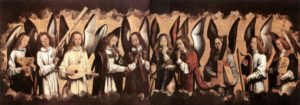 The Band of Waites (modern spelling Waits) is widely considered to be the precursor to the British Brass Band.
The Band of Waites (modern spelling Waits) is widely considered to be the precursor to the British Brass Band.
A Band of Waites could be found in every British town and city of any note from the medieval times to the early 19th century. The purpose of a Band of Waites varied from time to time and from city to city but included playing their instruments through the town at night, waking the townsfolk on dark winter mornings by playing under their windows, welcoming Royal visitors by playing at the town gates, and leading the Mayor’s procession on civic occasions.
Town waites or city waites originally were watchmen who patrolled at night, using a musical instrument to show they were on duty and to mark the hours. Over time the waites added more instruments and became more proficient at playing the instruments. They formed musical bands and were often attired in colorful liveries and sometimes would where silver chains.
The role of the Waites gradually evolved into groups of musicians employed by the towns. The Waites became official musicians employed in the large English towns, who were equivalent to the town band and no longer were employed for protective purposes. Their hours eventually changed to the morning and evening and they no longer performed during the ‘dead of night.’
The musical instrument most associated with the Waites is the shawm, also known as the wait-pipe. The shawm was a reed instrument with vent holes, the predecessor to the hautboy. A form of slide trumpet and later the sackbut, lute, viol, recorders, bagpipes, and fiddles were also musical instruments used by the Medieval Waits.
Musically inclined families tended to serve as waites, since this profession was more easily open to them than other musical occupations. The surnames Waite and Wakeman are derived from individuals who worked as waites. (Personally as a big YES and WHO fan I love this information.) Ferdinando Gibbons was one of the Waites of Cambridge; his sons Edmund, Elis and Orlando became notable musicians and composers. Some of the tunes are named after the waites of particular towns and cities, i.e. Chester Waits and London Waits.
Instrumentation varied but usually loud, penetrating wind instruments. Sometime during the early 19th century the British Brass Band evolved out of the early Band of Waites.
